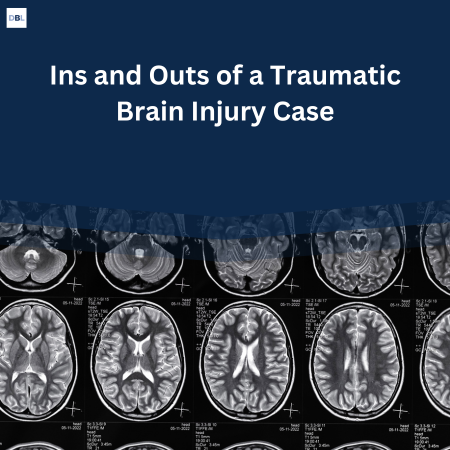
Understanding a TBI Personal Injury Case: South Carolina Traumatic Brain Injury Lawyer Explains
Out of all the potential injuries in a personal injury case, a traumatic brain injury is often one of the most catastrophic, disabling, and debilitating. This usually means that it is one of the most complex and involved types of personal injury cases to handle. Also known as a TBI, a traumatic brain injury in a car accident, fall, workplace accident, or any other incident can impact a person’s ability to work, live independently, and enjoy life with their family. Our South Carolina traumatic brain injury lawyer knows that there are many important aspects of a TBI case. A client should be aware of this as their case moves forward.
Here at David Blackwell Law, our compassionate and skilled team has a proven track record of success handling catastrophic personal injury cases for victims and their families throughout South Carolina. We do not treat cases like another number in the queue, but we offer personalized and dedicated service to each one of our clients and their families—especially in a TBI case. If you or a loved one were seriously injured in a personal injury accident and were diagnosed with a TBI, call our experienced South Carolina traumatic brain injury lawyers for a FREE consultation to learn what your rights to compensation may be under the law.
What is a TBI?
To understand the ins and outs of a TBI case, it is important to understand what is and is not a traumatic brain injury. The CDC defines a TBI broadly as “an injury that affects how the brain works.” Other definitions of a TBI provide that it is “a form of acquired brain injury, which occurs when a sudden trauma causes damage to the brain.” It can happen due to a jolt, shock, shake, or impact to the head, or even without any impact to the head.
Types of TBIs
There are many different types of TBIs; some of the most common ones include the following:
- Concussions
- Coup contrecoup TBIs
- Diffuse axonal injuries (DAIs)
- Brain bleeds
- Penetrating brain injuries
- Hematomas
- Contusions
- Whiplash-related injuries, and
- Other injuries to the brain that may affect how it functions.
Any brain injury, even if it is classified as “mild,” can be a TBI. It can also be a significant personal injury case, as there is no such thing as a “mild” brain injury—the law considers any brain injury a very serious injury that may qualify for compensation.
How are TBI Cases Handled?
How a TBI case is handled depends on whether you have hired an experienced South Carolina traumatic brain injury lawyer like ours or not. When you hire a skilled and knowledgeable personal injury law firm like ours, your case will typically look like this:
Pre-litigation Investigation
This includes gathering accident records, medical records through HIPAA authorizations and compiling paper evidence to review what happened, formulate a factual summary, and determine injuries.
Pre-litigation Expert Review
Some cases will be reviewed by an expert to help determine liability or damages, including future needs.
This can help create a stronger demand or complaint that starts a lawsuit.
Pre-litigation Settlement Demand
This is a demand to a defendant and/or the defendant’s insurance carrier to resolve the case pre-lawsuit. This offers a faster avenue to recover compensation. However, some adjusters will sometimes “discount” the amount owed to a victim because there is no litigation risk in settling early. However, an aggressive lawyer like ours can fight to ensure that you receive the correct and fair amount you deserve.
Commencing the Lawsuit
Starting a lawsuit is a big deal and includes drafting allegations in a complaint against all possible defendants and serving them. This is the initial pleading stage and is important.
Making and Responding to Discovery Demands
The start of a lawsuit is about exchanging medical records, witness information, accident reports, and other evidence or materials that can be used in the prosecution or defense of a matter. This is generally a full-disclosure part of the case, where the parties share what information they have as to any claims or defenses.
Examinations Before Trial or Depositions
Some cases may be won at depositions but more are lost at depositions because of lack of preparation. This is an important part of all cases where lawyers from each side get to ask questions to the parties and witnesses under oath. The deposition is recorded by a stenographer and is an official record of testimony that can be used later in the case. Many cases can settle after a deposition when certain facts come out that could help or hurt a case, especially for a defendant.
Post-Deposition Discovery
Sometimes in depositions, additional evidence is identified, and the parties can require post-deposition discovery to obtain it. Most times, these are medical records or witness names.
Medical Examinations
Since a plaintiff is putting their health in controversy, the law allows the defendant to require the plaintiff to submit to a medical examination. This is often called an “independent medical examination” or IME because the doctor is not the plaintiff’s physician but an “independent” doctor. However, this is really a misnomer because the defense pays for the doctor, the report goes to the defense, and the defense usually has a working relationship with the “independent” doctor—who has every reason to give a defense-friendly report. We call it what it really is, a DME or “defense medical examination.”
Thus, most IMEs are not “independent” and often are not plaintiff-friendly. If that is the case, we may have another independent medical examination from an expert of our choosing to help balance the inequity and bias.
Advising the Court We Are Ready for Trial
After discovery and examinations, we advise the court we are ready to proceed with a trial date. This is when the court will begin to conference the case and pick a trial date, handling motions, requests, and other issues to narrow what needs to be tried.
Motion Practice
Once the parties alert the court that the case is ready for trial, there is usually a series of motions.
The defense typically makes these to narrow issues or get the matter dismissed, such as for summary judgment.
This type of motion asserts that there are no questions of fact or law in the case and that, in viewing the evidence in a light most favorable to the nonmovant (the plaintiff usually), the defendant still wins. As a TBI victim, this can be a high-stakes motion because it could get your case dismissed. Having an experienced South Carolina traumatic brain injury lawyer like ours to defend your case is crucial to protecting your claim.
Mediation and Pre-trial Conferences
It generally occurs before motions have been heard but may be after motions are heard, the court will require mediation to try to settle the case. Roughly 95% to 98% of all civil cases settle in the United States, meaning most personal injury cases do not go to trial. The court will also conduct pre-trial conferences to set up witnesses, evidence, and the course of the trial.
Trial
This is when your lawyer puts on witnesses, presents evidence, and litigates the matter in front of a twelve (12) person jury to present your case and recover damages. It is the pinnacle of our justice system.
Post-trial Motions and Appeals
After a trial, both parties have the opportunity to make post-trial motions to reverse liability or the award of damages. There is also the right to make an appeal, even if you won, to seek higher damages if a judge or jury came back with a low award.
Have More Questions About the Ins and Outs of a TBI Case? Call Our South Carolina Traumatic Brain Injury Lawyer for Help
If you or a loved one suffered any personal injuries in an accident, especially a traumatic brain injury or TBI, call David Blackwell Law. Our experienced South Carolina traumatic brain injury lawyers know how to build a damages case while proving liability, ensuring that victims and their families are protected under the law. Learn more during a FREE consultation by scheduling your appointment today. Dial 803-285-0225 to get started with our personal injury law firm.
